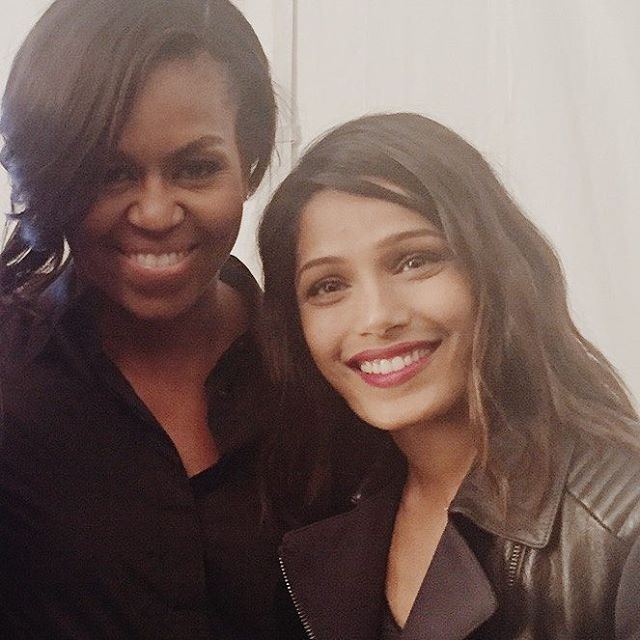
@letgirlslearn

@letgirlslearn
Actress Freida Pinto has joined hands with the Michelle Obama, the First Lady for Let Girls Learn – a government initiative aimed at helping girls obtain quality education. Freida, along with Michelle Obama, her daughters Sasha and Malia, their grandmother Marian Robinson – will travel to Liberia, Morocco and Spain at the end of June and early July as part of the Let Girls Learn initiative, a statement issued on behalf of the ‘Slumdog Millionaire’ actress, stated.
Help us share the #LetGirlsLearn story. Apply for the #WHFilmFest today: https://t.co/PIiUyFEAHj https://t.co/Hhan7ntZ9i
— The First Lady (@FLOTUS) June 8, 2016
The focus of the trip, which includes Monrovia, Marrakesh and Madrid, is for them to speak to young girls about the importance of education and staying in school. Starting with Liberia, Freida and Michelle will take part in a discussion which will cover the educational barriers girls face in the country.
In Liberia, Pinto, 31, and Obama will take part in a discussion, which will cover the educational barriers girls face in the country. President Ellen Johnson Sirleaf will meet with the First Lady and Pinto. Next, in Morocco, Hollywood star Meryl Streep will be seen joining Michelle and Freida to discuss the challenges women in the African country deal with on a regular basis.
Freida Pinto, Michelle Obama join hands for ‘Let Girls Learn’ initiativePinto, who became popular after her award winning role in Slumdog Millionaire, recently launched a women’s empowerment project at the 69th Cannes International Film Festival. As Plan International’s Girls’ Rights Ambassador, Freida Pinto is fast following in the humanitarian footsteps of Hollywood starlets like Angelina Jolie, Emma Watson and Beyonce, using their fame to help shine a spotlight on issues affecting women and girls around the world.
In a recent interview, Pinto said, “There are events in history that should have shaped the future for women differently, but they haven’t so far and that’s been frustrating. But now there’s a huge amount of awareness and technology has made it possible for people to come together and not isolate their struggles. The struggles of a girl from Africa aren’t that different to those of a girl in India, and in turn, a girl in America. No matter how modern and educated she might think her community or society is, there’s still sexual violence against women, there’s still rape. I think technology has made it easier for people to come together, and their voices are united and louder than ever before.”
Acknowledging that she always knew that she was “born more privileged than some of the girls who I’ve met through Plan,” Pinto believes that she feels “that protection, comfort and privilege I had growing up is something that every girl should have. We’re not asking for a luxury car or a big home, we’re just saying that girls should be able to go to school. That’s not a big ask. There’s a domino effect that may start small but before we know it, we can have an impact on a whole community, then a whole nation, then the world will catch up. We have to start small though.”
Pinto, who had travelled to some of the poorer nations advocating for women’s ruights and education, recalls her earlier trip to Sierra Leone, “where I met one little girl at a school, during a class discussion about what the children wanted to become when they were older. This girl said to me that she’d like to become a finance minister. I was like, ‘Wow, that’s kinda boring but great!’ I asked her why and she said: ‘Because my country does not know how to spend their money on what they should be spending it on, and I would like to help them do that.’ These girls have no choice but to be aware of what’s going on around them and so many of them are using this knowledge to their advantage, which is really inspiring.”





Be the first to comment